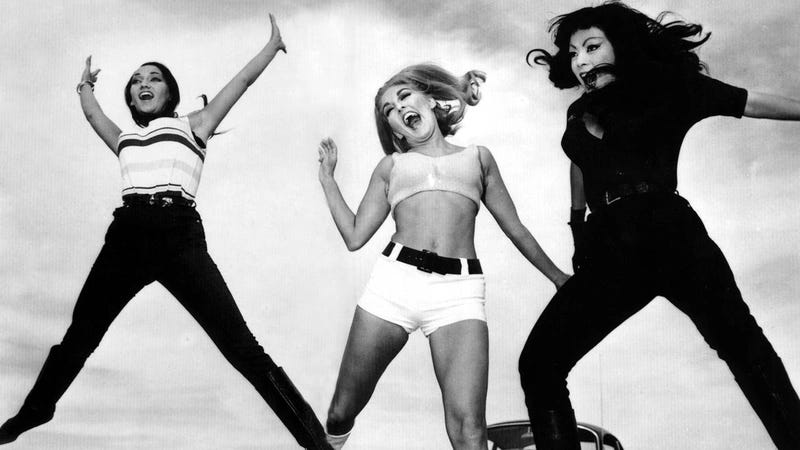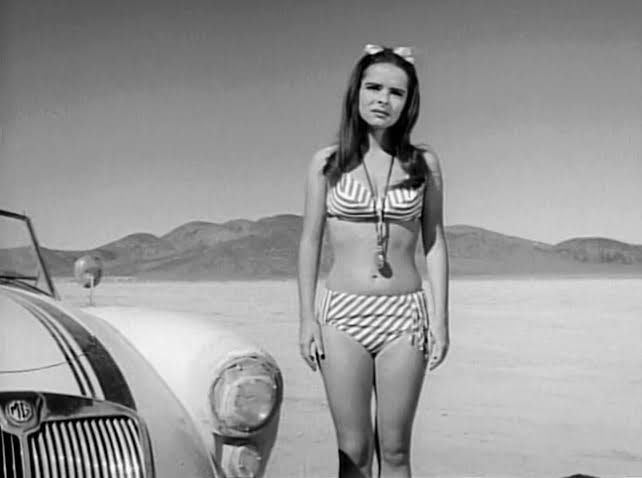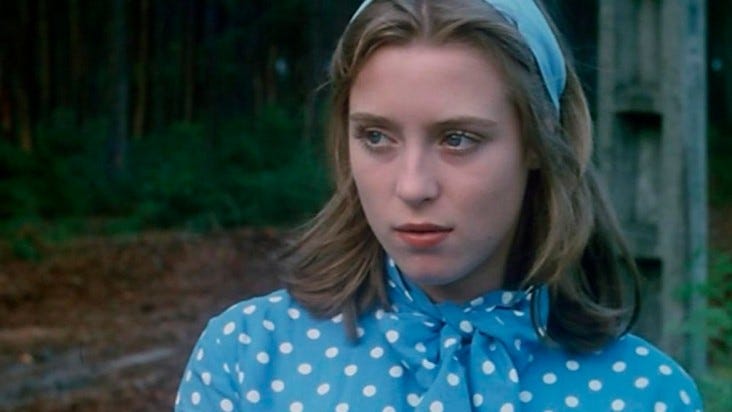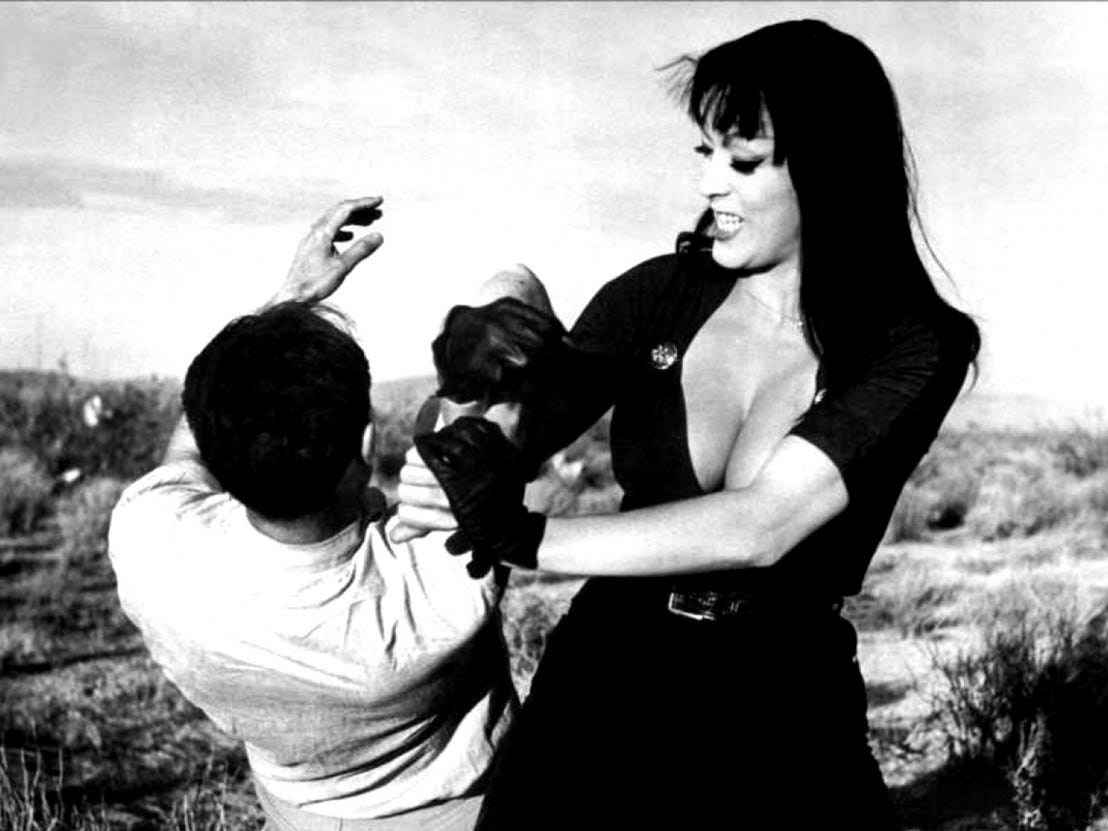🎀 Feminist Films vs. "Faster, Pussycat! Kill! Kill!"
After publishing a slightly controversial piece, I'm breaking down what I think about feminism on film
Recently, my essay in defense of the feminism within women-in-prison films went live on Polyester Zine, and it led to a bit of protesting in the comments of this reel. Understandably, criticism came from the most deceptively misogynistic characteristic of the genre, namely its tendency to depict marginalized “bad women” as sexual creatures who explicitly undergo abuse (yet who ultimately riot and break free, which sadly went unmentioned). One user’s complaint kept ruminating inside my head. It stated there was nothing revolutionary about “validating ” sleazy prison flicks so now I’m questioning whether it’s actually acceptable or not to “not validate” certain films. Who’s got the last word when it comes to feminist politics onscreen?
Now, I may not possess the brains of King of French Films André Bazin (who wrote the iconic pink-covered “What Is Cinema?”, with foreword by 🎀 Jean Renoir 🎀) but I’ve sat in adoration before the moviegoing & moviemaking worlds for quite long so naturally, I too have some theories of my own. I admit upfront though that I DON’T HAVE ALL OF THE ANSWERS as to what makes a movie feminist or not, but I stand firm in that political cinema shouldn’t stick to rigid “do’s & don’ts”.

One of my major pet-peeves with the disciples of 🎀 non-problematic feminist films 🎀 is that they disregard any movie wherein “male fantasies” dominate the screen. Take a flick by tittyboom-genre pioneer Russ Meyer, for instance, who released the iconic “Faster, Pussycat! Kill! Kill!” to no flabbergasted audience in 1965. A box-office flop upon its release now regarded a cult hit, it revolves around homicidal lesbians who drive fast, kidnap and behave like tough broads towards decreptive lecherous guys.
When asked to elaborate on the motivations behind it, my controversial “King Leer” responded like this: “[In my movies] I had men kicking the shit out of the women so I thought, ‘why don’t we do one where the women kick the shit out of men?’¹. Sounds pretty brilliant to me! In spite of the aformented traits, however, not even *I* can negate that the Pussycat characters REEK of the male gaze. Doesn’t matter if they’re wrestling or dressing, the superladies always conveniently flaunt their blessed buxomy bodies with tight wasp waists satisfying not just the male moviegoers’ voyeurism, but the filmmaker’s fetishistic projections as well. It doesn’t help that the movie is packed with a very in-your-face kind of violence either, as that’s often considered another “male fantasy” trait.

What’s interesting to me, though, is that the objectification (or tittyllation) of the go-go dancers from Faster, Pussycat! doesn’t strike me as off-putting or misogynistic in the least. In fact, I’d go as far as to argue that the oversexualization only adds to the movie-peeping pleasures as it incites to an active erotic contemplation of Meyer’s peculiar perversions (believe it or not, some of us are into his comic-book brand of smut). I think there’s a bit of paternalism to contemporary feminist film discourse in their quick dismissal of any male-conceived depictions of sex. Sure, some of it deserves the bashing (but that’s simply what *I* think!) yet just because sex is shot lavishly or cartoonishly or the actresses show clevage or aren’t covered from head to toe shouldn’t immediatedly discredit the pro-women values of some movies, or connote that they’re intrinsically demoralizing works.
Besides, I can’t think of a perfectly feminist form of depiciting female sexuality anyway as, to quote Laura Mulvey and Colin MacCabe in a similar territory of thought, “female nakedness carries associations of the exploitation of women that almost no degree of formal subversion can displace.”² When women filmmakers shoot sex from their “female gaze”, it tends to come across as vapid and utterly restrained. More often than not it’s devoid of risk and beauty and glamour for fear of “objectifying” the female form as if artifice and eroticism were inherently morally wrong. Personally, I *like* feeling aroused as a spectator and why shouldn’t I be allowed if a) male moviegoers have had their fair share all this time plus b) the cinema is art AND amusement, right?
Margaret Atwood surely was onto something about the feminine consciousness when she stated “you are a woman with a man inside watching a woman”³. It’s fact that if you’re born female, patriarchal socialization is deeply ingrained within your DNA and, in the context of this essay, within your GAZE as well. What baffles me is how come men are not expected to identify the “male fantasy” traits inside their cinematic taste and work towards reforming themselves. Girls on the other hand are supposed to denounce and feel shame over any displays of arousing female sexuality or else, they’re traitors and suspected of carrying loads of internalized misogyny anyway. To be fair I think there’s much more women’s-liberation in embracing the aspects of your gaze that fill you with a-thrilling pleasures than in submitting your preferences to correction through guilt and intellectualization.
Additionally, it’s so insane to me when violence is looked down upon as another problematic perpetrator for movie-misogyny just because some queer-feminist audiences prefer tamer images from their flicks. In my opinion, there can be a whole lotta subversion in women avenging men (see: the genre of rape-revenge) as much as in explicitly depicting anti-female aggression (see: the genre of women-in-prison!).
Palatable, non-threatening, non-angry feminism on film rarely evokes any meaningful emotions from me. I make the exception when it comes to something odd like an endearing Shirley Temple vehicle (see pro-women’s-lib “Adventure in Baltimore” from 1949) but as spectator, I tend to gravitate towards more fury in my picks. I am inspired by French extremists like Catherine Breillat (imo the Camille Paglia of feminist films) who employ loads of onscreen fuckery to create beautifully provocative work. Her refusal to stick to a feminist agenda or to tone down her cynicism allow her movies to say SO MUCH MORE about the state of woman in society than the sanitized, “I don’t want to offend anybody” contemporary approach ever could.

I think brutal cinematic representations of physical aggression can inspire catharsis, reflection and even lead to progressive forms of action as long as a) the victims in the film seek liberation and b) the story manipulates the viewer into boiling up in frustration. Perhaps an exception would be Catherine Breillat’s controversial film “Fat Girl” (2001) which, alongside shocking doses of violence, contains explicit inspections of statutory rape with no clear condemnation at play. Naturally, this rare take by a female director has led users to denounce the picture as “trauma porn”, “I was convinced this was written by a man”, “sick” and, most notoriously, “dangerous” (!) yet those traits are precisely what I most admire about the film. As a consequence of not restraining the “male fantasies” inside her head or directing-on-eggshells or telling an overly moralistic story from a self-congratulatory lens, Breillat addresses taboos of high feminist relevance that almost no one dares to explore. What I love the most is that she exemplifies what is SO NEEDED from any political movement, namely to preserve her critical thinking skills and continually push and question the status-quo.
If, as a movement, feminism benefits from the various branches it’s got (black, marxist, trans, etc.) then I think a similar approach should be considered for the arts. I’m all for people sharing their personal observations regarding film representation, but a lack of nuance seems to permeate current feminist cinephillia in its assumption that there’s a certain pro-woman onscreen ideal that we ALL agree on and ought to be fighting for. Feminist cinephiles must begin to acknowledge that there *are* contradictions among possessors of the female gaze and that ultimately, no one’s got actual authority anyway! To me, this war of invalidating the subversiveness and feminism found in movies wherein the male fantasy seems to command (see: Fat Girl or Faster, Pussycat!) is absurd and just giving off major censorship vibes.
¹ From Big Bosoms and Square Jaws: The Biography of Russ Meyer, King of the Sex Film by Jimmy McDonough, 2005
² Excerpt from the essay ‘Images of Women, Images of Sexuality: Some Films by J.L. Godard’ from Visual and Other Pleasures by Laura Mulvey (co-written with Colin MacCabe), 1989
³ Margaret Atwood, The Robber Bride, 1993






